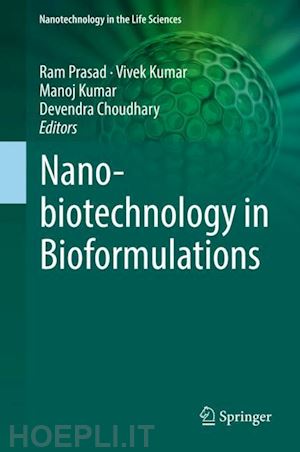Ram Prasad is associated with Amity Institute of Microbial Technology, Amity University, Uttar Pradesh, India since 2005. His research interests include applied microbiology, plant-microbe-interaction, sustainable agriculture and nanobiotechnology. Dr. Prasad has more than one hundred fifty publications to his credit, including research papers, review articles, book chapters, five patents issued or pending, and several edited or authored books. Dr. Prasad has twelve years of teaching experience and has been awarded the Young Scientist Award (2007) and Prof. J.S. Datta Munshi Gold Medal (2009) by the International Society for Ecological Communications; FSAB fellowship (2010) by the Society for Applied Biotechnology; the American Cancer Society UICC International Fellowship for Beginning Investigators, USA (2014); Outstanding Scientist Award (2015) in the field of Microbiology by Venus International Foundation; BRICPL Science Investigator Award (ICAABT-2017) and Research Excellence Award (2018). He serves as an editorial board member for Frontiers in Microbiology, Frontiers in Nutrition, Academia Journal of Biotechnology and is the series editor of Nanotechnology in the Life Sciences, Springer Nature, USA. Previously, Dr. Prasad served as Visiting Assistant Professor, Whiting School of Engineering, Department of Mechanical Engineering at Johns Hopkins University, USA and presently works as a Research Associate Professor at School of Environmental Sciences and Engineering, Sun Yat-Sen University, Guangzhou, China.
Vivek Kumar is an associate professor at the Himalayan School of Biosciences, Swami Rama Himalayan University, Jolly Grant, Dehradun, India. He currently serves on the editorial boards of various respected international journals, including EnvironmentAsia, International Journal of Biological and Chemical Sciences, Environmental Sustainability, Journal of Advanced Botany and Zoology, and Journal of Ecobiotechnology. Heis also a reviewer for prestigious international journals such as the Journal of Hazardous Materials, Environmental Sustainability, Science International, Acta Physiologiae Plantarum, Environment Science and Pollution Research, and Rhizosphere. He has authored more than 100 publications, including research papers, review articles, and book chapters, and also edited several Springer books. Dr. Kumar has served as a microbiologist in the Department of Soil and Water Research, Public Authority of Agricultural Affairs and Fish Resources, Kuwait for eight years. He has been credited with the first report and identification of Pink Rot inflorescence disease of date palms in Kuwait caused by Serratia marcescens. He was awarded the 2002 Young Scientist Award in agricultural microbiology by the Association of Microbiologists of India (AMI). Dr. Kumar’s research areas include plant-microbe interactions, environmental microbiology, and bioremediation. He has also organized various outreach activities.
Manoj Kumar is an associate professor at Centre for Life Sciences, Central University of Jharkhand, Ranchi, India. He is committed to high-quality science that contributes to both increasing intellectual knowledge of plant development and increasing the ecological niche. He has pursued his PhD in plant biotechnology at the prestigious Jawaharlal Nehru University and was then awarded two postdoctoral fellowships: DBT-PDF from IISc Bangalore in 2005 and then NRF-PDF from the Universities of Pretoria and Melbourne. He currently leads a diverse life sciences research group supported by DBT-BUILDER program, Ministry of Sciences and Technology, Government of India. He referees for several journals, including Phytoremediation and the Journal of Soil Sediments. Dr. Kumar’s research focuses on the integration of microbial genetics with a range of plant physiological approaches to enable novel gene discovery and conferring of metabolites.
Devendra K. Choudhary has over 16 years of research experience in microbiology and microbial biotechnology. He is currently an Associate Professor in Amity University, Noida. Before joining Amity University he spent several years in Mody University, Lakshmangarh, Rajasthan, as an Assistant Professor preceded by People’s University and Barkatullah University, Bhopal, as an Assistant Professor cum Scientist. Dr. Choudhary received his Ph.D. in Microbiology in 2005 from GB Pant University of Agriculture & Technology, Pantnagar, after having received his M.Sc. in Microbiology from MDS University, Ajmer and qualifying CSIR-UGC-NET in 2002. Dr. Choudhary has worked on GOI sponsored major projects as Principal Investigator (PI). Recently, he worked on two major projects for the DBT and SERB at Amity University preceded by the DST FAST-TRACK project at the Department of Biotechnology, Barkatullah University, Bhopal. As an active researcher, Dr. Choudhary has published 80 research and revie











